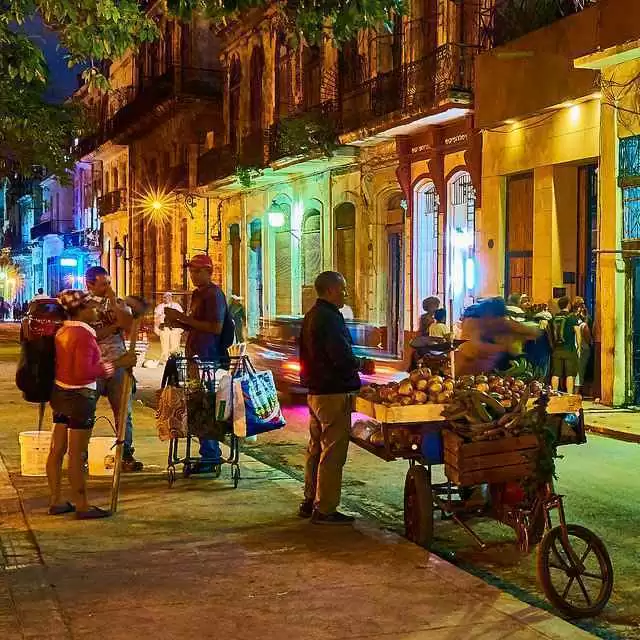
Celiac.com 01/05/2018 - Cuba is abundant with music, color, and people. The countryside is a lush, rich green where fields of sugar cane stretch as far as the eye can see. Streets of Havana are filled with hot pink, lemon yellow, candy-apple red, bright blue and green classic cars. Rural streets have horse drawn carts overflowing with harvested sugar cane and the men (almost always men) with machetes from cutting the crops. It is a country of contradictions, where pillars of ancient affluence intersect with rubble as people yack on cell-phones while throwing their fishing lines off the Malecon.
As a multiple-time tourist there, I'm overwhelmed with how friendly people are and how safe I feel, even though my ability to speak Spanish is, well, not-so-good. Given that wifi and internet connections are few and far between, my translation app doesn't work so I'm on my own when it comes to ordering food and figuring out if it's gluten-free or not. Between my Spanish being awful and the fact that menus may not be in English, much less contain a list of ingredients, asking the wait-staff if there are gluten-free menu options is a no-brainer. The communication and interpretation challenges meant that it made no sense for me to ask that question.
Celiac.com Sponsor (A12):
So how does one go about being gluten-free in Cuba? Actually, it's not so hard once you keep in mind certain facts. One is to understand the traditional daily diet of most Cubans. Food staples include rice, beans, pork, beef, and sometimes chicken. These are all safe for people with Celiac disease. You're likely to find these foods at every meal in every home or restaurant. Cubans do not tend to use a lot of spices because they don't have them; processed foods are generally unavailable which makes food rather bland but on the other side, pretty safe because the chances of being exposed to gluten-filled flavor enhancers aren't around. Breads may be served but they, like the delicious-looking fried dough sold on the street in baskets or papers by local vendors, can be easily avoided. Pasta dishes are found in many restaurants, and the pasta is always wheat so forget asking if they have corn, rice of quinoa pasta. Eggs are pretty easy to find; cheese somewhat, but peanut-butter is not.
For many people going gluten-free, vegetables are a life-saver. However, in Cuba this option is something we need to have a serious conversation about. Vegetables are hard to come by. Now, there is a big organic farm program in Cuba. Organopónicos, or organoponics, is a system of urban agriculture using organic gardens that originated in Cuba and is widely used there. The idea is for them to produce organic, highly nutritious vegetables in an efficient way that maximizes the use of natural resources, composting, and recycling. The farm I visited outside of Havana distributes 90% of all the produce to local residents; only 10% goes to hotels and commercial vendors. The organoponics movement is trying to lure Cubans away from their primary reliance on rice, beans and meats into eating more produce. There is a heavy health emphasis related to nutrition there – there are hospitals and health care providers, but they aren't plentiful and tend not to be the first line of health care. Food is a primary vehicle leading to better health. Sweets, salty foods and fats are not nearly as common there, due to the lack of imports of such items in this still largely socialistic country. Foods are simpler, and seem to be more “real”, if you get my drift. Since Cuba is an island, fresh fish is a good choice for meals. If you order a salad, expect them to be small and consisting primarily of lettuce (not iceberg!), thinly sliced cucumbers, and maybe a bit of grated cabbage. Don't go looking for tomatoes, broccoli, carrots, potatoes, Brussel sprouts, squashes or kale. Chances are low that you'll find them. It's more likely that when you find vegetables, they are present more as garnish.
Fruits, on the other hand, can be easily purchased at corner open-air markets where farmers bring bananas, plantains, pineapple, mangos, papaya, and coconuts. They are beautiful and fresh, and can be served on plates as main foods, garnishes and certainly as juices.
Food isn't why one goes to Cuba. Mojitos and rum may be (thank God they are gluten free!), cigars are a draw, and a tiny cup of their coffee will keep you rolling all day. People who have to go gluten-free have often gotten used to watching what they eat and having limited options, so in this regard traveling to Cuba is no different. In some ways it's a bit easier because of the lack of processed foods and fancy, hidden ingredients that make their way into both gourmet and convenience foods in the United States. Cuba is more of a what-you-see-is-what-you-get culinary world. Gourmet cuisine hasn't arrived there yet. Neither have fast food items that U.S. people have come to take for granted. It's not uncommon to overhear people at the airport planning what they're going to eat when they get back to the states.
My advice for anyone going gluten free in Cuba is to pack some nuts, dried fruit, protein bars, and easy-to-keep-and-transport favorite gluten-free food options. Expect when you go out for breakfast to have fruit and eggs. Dinner will likely be a meat/chicken/fish that is simply prepared so it should not usually be a gluten issue. Rice and beans are usually cooked without much seasoning, so you're probably safe eating them. Definitely avoid anything that is deep fried, because chances are high that a bread was cooked in the oil. Plantains that are fried are probably safe because they are cooked in butter or oil in a skillet. Fresh fruits are abundant, just sometimes a bit complicated for tourists to manage when purchased on the street if they don't have knives or ways to cut and serve them in a non-messy fashion. Don't expect to see many veggies, and when you do, relish them. And of course the mantra for most tourists traveling there is – don't drink the water! There's plenty of bottled water, rum and juices around, so you should not get sick from either gluten or water if you're nominally careful. Remember why you're in Cuba – not for fine dining, but to see the culture, listen to music, and have fun.






Recommended Comments
Create an account or sign in to comment
You need to be a member in order to leave a comment
Create an account
Sign up for a new account in our community. It's easy!
Register a new accountSign in
Already have an account? Sign in here.
Sign In Now